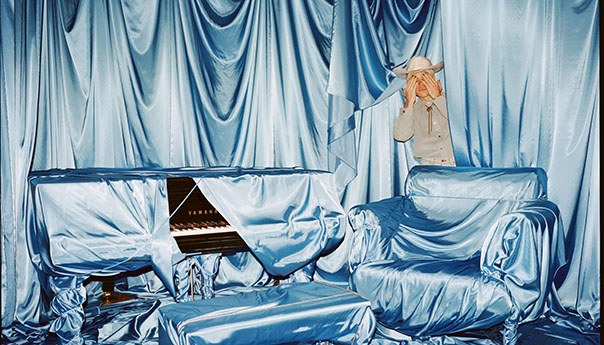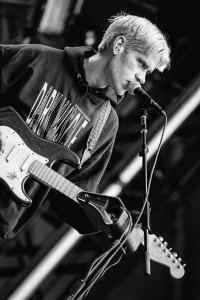From the ground up: Porches’ Aaron Maine talks foundation of The House

Experimental folk artist and cellist extraordinaire Arthur Russell may be one of the greatest underground musicians of his day. In spite of releasing only one traditional non-collaborative studio album, World of Echo (he died in 1992), Russell was one of the most hardworking and prolific artists of his time, with masterful orchestration of sound and space. Russell’s work ethic is revealed within the work of Porches‘ Aaron Maine, who has carefully studied his work.
Porches
Girl Ray
8 p.m., March 5 and 6
The Chapel
Tickets: $18-20.
“There’s something undeniably special charming and brilliant about [Russell],” Maine said in a call a couple of weeks ago. “What an amazing effect he’s had on the world and musicians, and it’s sad that he wasn’t really met with that while he was alive. I think that’s a large part of the inspiration for me.”
For the Porches frontman, Russell was also a huge inspiration in experimenting. “I think not being scared to explore different genres was a big thing I learned from him,” Maine said. “The magic is in the folk songs he wrote on acoustic guitar, the distorted echo delay on the cello and his work with a drum machine. I feel like it’s OK to explore and go with your gut.”
Maine’s willingness to experiment and refine his craft is obvious on his new LP, The House. Although the New York artist is one month removed from the release of that album, he still has 30 to 40 additional unreleased tracks at his disposal. A follow-up to The House in the near future would not be surprising.
“I was home all year and it was amazing; I just worked every day, wrote every day and recorded every day that I could,” he said. “Reluctant as I am to have to put it down for the time being while I go on tour, it will be good to listen back and piece it together and see if there’s a record there.” Porches’ tour will bring Maine and his bandmates to the Chapel for two shows next week.
Similar to Frank Ocean’s Blonde, The House often eschews accessibility for simplicity and subtlety. There’s a slew of euphoric moments, but the real revelation is the minimal, romantic balladry that manages to scratch an itch few others can accomplish. The slower songs are coupled with a few sparse elements, but the combination of Maine’s imperfectly allaying voice, his arresting lyrics and subtle production choices captivate as they did on 2016’s Pool, but with a slight twist and sense of musical maturation.
“I always try and not repeat myself, so while the elements that run through everything are my voice and sense of melody, it’s something so inherent that you can’t really change much,” he said. “Sound-wise, I’ve spent a lot more time with production and I think there’s been a lot of really exciting stuff I’ve uncovered in song structure and sound. I do think The House was meant to be raw in a number of ways—raw, still and kind of cold in the moment, but very cared for and combed over.”
While Maine’s music in the past displayed an affinity towards synths of the ‘80s, The House shows a shift away from that and toward something ‘90s-inspired, while nodding to contemporary pop. A large reason for this shift is due to the numerous synthesizers at his disposal.
“Right as I was putting the finishing touches on The House, I downloaded the plug-in for the Korg M1, which [was] a really popular synth in the early ’90s,” he said. “It’s got some really weird clunky [sounds that], almost could be tacky, depending on how you use them. Another [synth] that I have is the TX81Z, a rack FM synthesizer that Yamaha made.”
Due to Maine’s willingness to break out of songwriting cliches of indie-inflected synthpop, The House is a mature step up from the last Porches album. Main has developed his songwriting and production chops a bit more along the way, cementing him as a producer on the rise. It took Maine locking himself in his apartment over the course of a year to accomplish.
“It’s like learning a language; I think the more time I spend [producing], the more in tune I become and the better I become at making what imagine come to life,” he said. “Sometimes I daydream about working with another producer, and maybe turning in a basic song and having them be in charge of the production. That’s something I might try in the future, but for now, [it] feels good to stumble through the process myself.”
Maine and his girlfriend, songwriter-actress Kaya Wilkins, share a mutual love of making music. Wilkins, as “Okay Kaya,” sings on The House track “Åkeren,” an Norwegian reiteration of a poem Maine previously wrote. In turn, Maine contributed vocals to Okay Kaya’s forthcoming debut album. Wilkins has become a muse for Maine.
“I find her inspiring. Musically, her lyrics, melodies and the way she approaches her craft; it’s exciting and amazing to get to be so close to someone else’s process and watch them do their thing,” he said. “When you share so much with someone, it’s hard to separate yourself from your heart and your experience from your art, and if someone else is present in your own experience, part of your experience [is] with them.”
Aside from his recent collaborations with Wilkins and rumored contributions to Blood Orange’s upcoming album, Maine expresses a desire to work with other artists in the near future. He’d love to work on a Rihanna song, for instance.
The creative process isn’t always smooth sailing, and Maine has struggled, at times, relying on music for his livelihood.
“I constantly try to step away and just understand that you can’t force things,” he said. All you can do is keep the channel as open as possible and hope that something good comes out every now and then. Making music is what keeps me going in life. If I weren’t doing that, I don’t know what I’d be doing. It generates so much self-worth and purpose. … You can only pick it apart so much, but it’s just something ingrained in my psyche. It feels so great to work.”
Follow writer Kyle Kohner at Twitter.com/kylejkohner.

